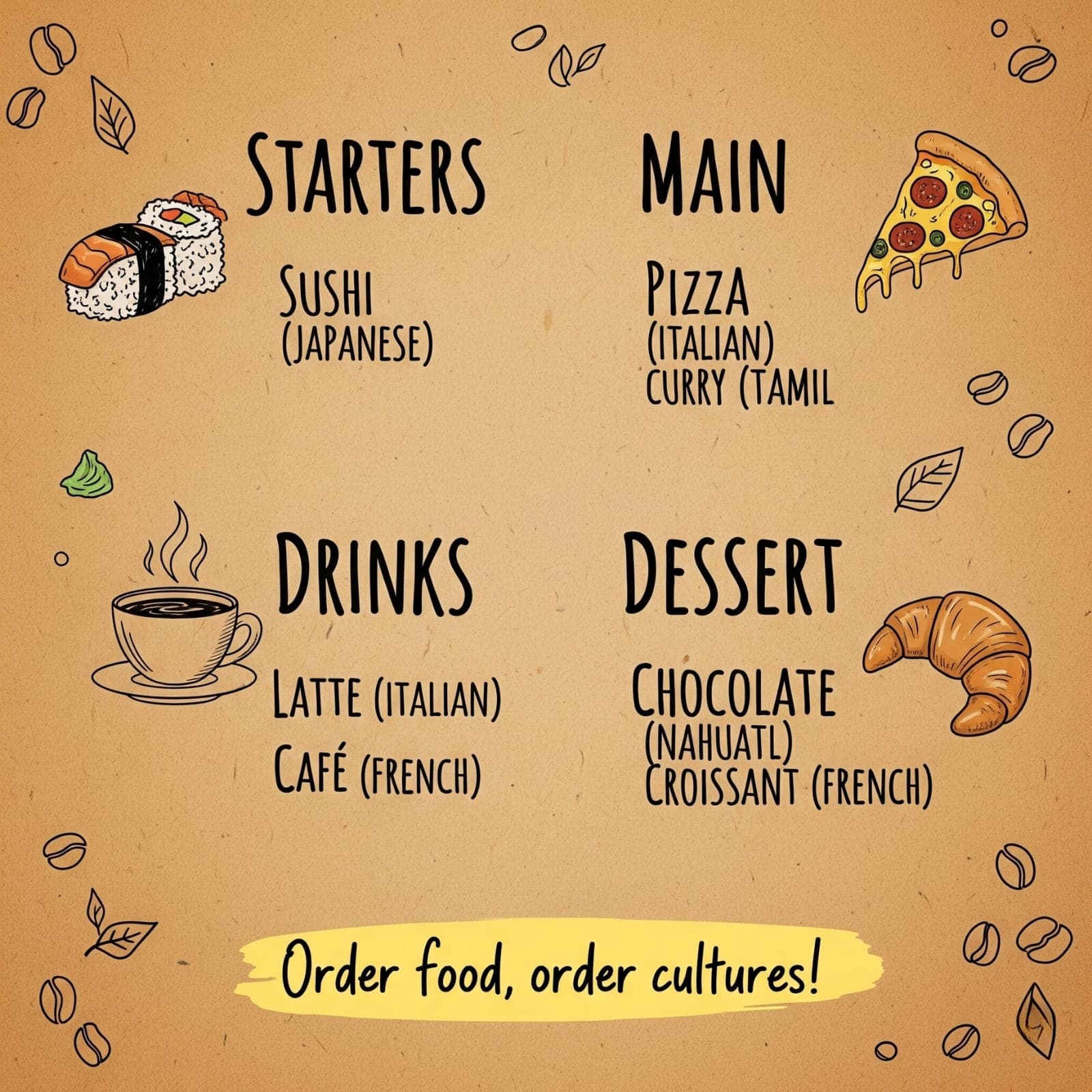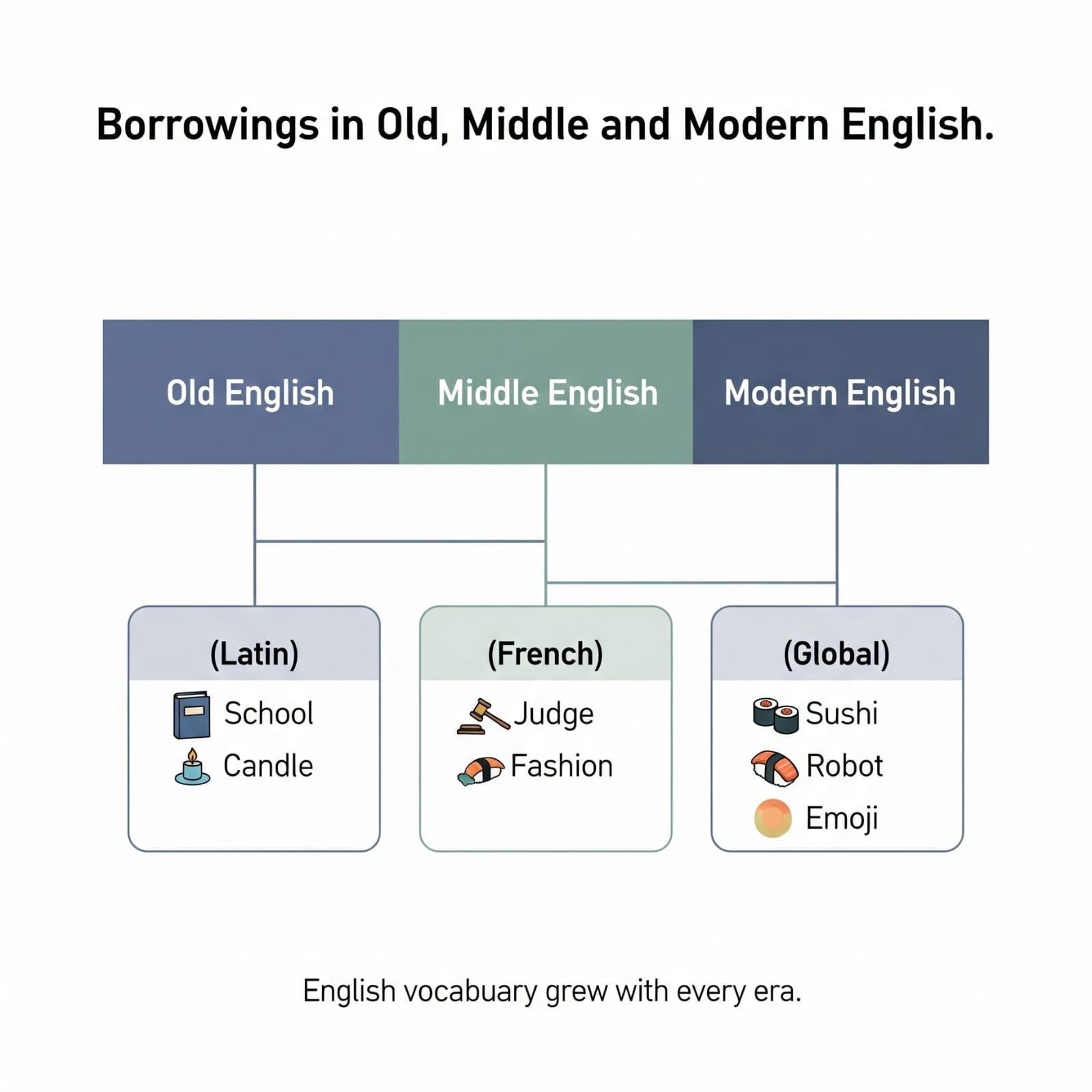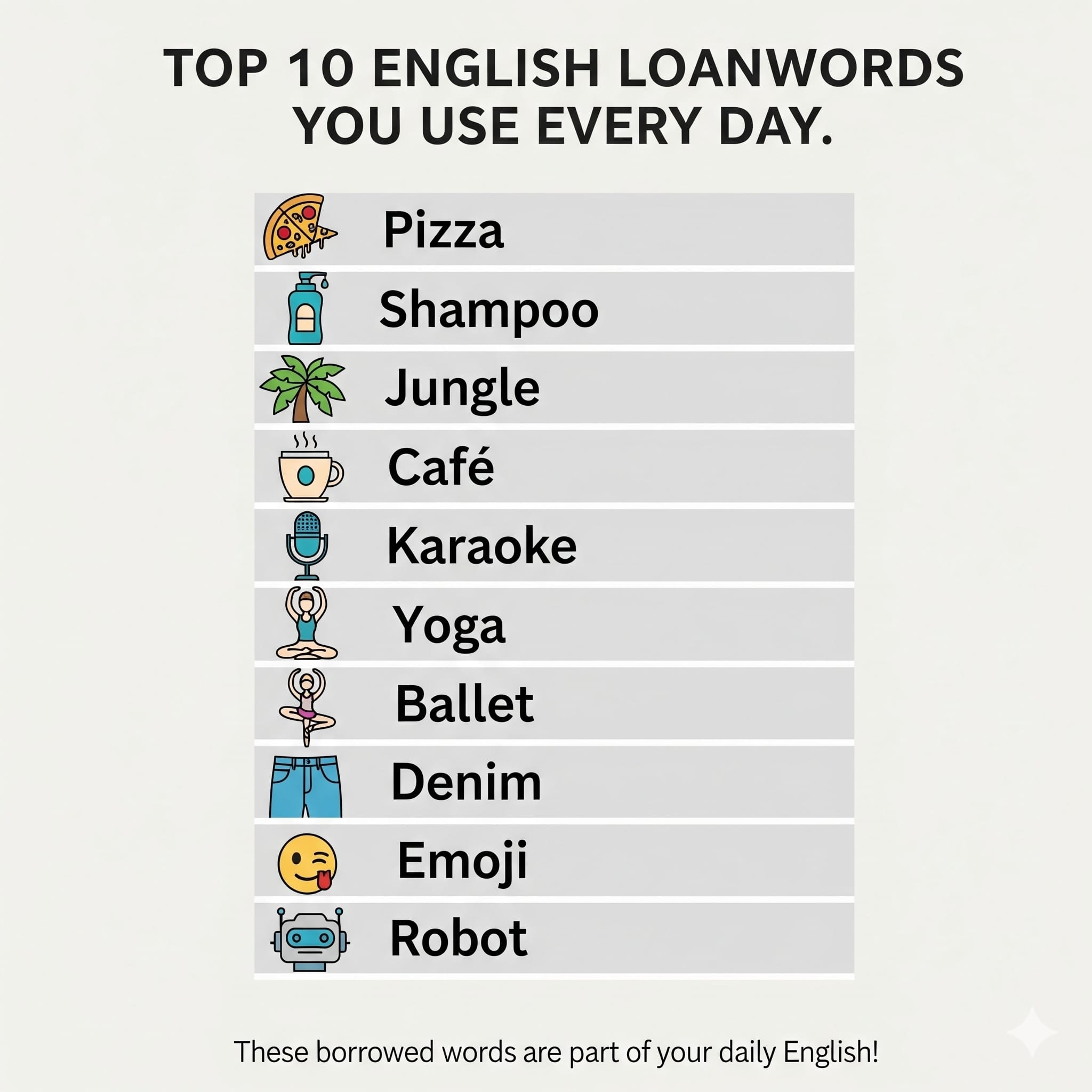Fun with Words: 50 Loanwords and Loan Phrases in English
Explore the fascinating world of English loanwords and loan phrases. Learn about language borrowing, cultural origins, tips to use loanwords naturally, and practice with Clapingo to improve fluency.

Loanwords in English
English—A Global Mosaic of Words
English is one of the most widely spoken languages in the world, but it’s not “pure” English in the sense that every word originates from Anglo-Saxon roots. Instead, English is a living mosaic, constantly absorbing words from other languages. Words borrowed from other languages are called loanwords, and they add richness, precision, and cultural depth to the language.
Think about your daily vocabulary: from pizza to yoga, café to emoji, you’re already using loanwords without even realizing it. These words not only make communication colorful but also give insights into global history, trade, and cultural exchange.
In this blog, we’ll explore English loanwords, the history of language borrowing, practical ways to use them in conversations, and tips to speak naturally using these borrowed gems.
What Are English Loanwords?
A loanword is a word adopted from another language with little or no modification. Unlike translations, which convert meaning into native words, loanwords carry the original term into English.
Examples of common loanwords:
“Kindergarten” (German – “children’s garden”)
“Safari” (Swahili – “journey”)
“Ballet” (French – “dance”)
“Robot” (Czech – “forced labor”)
Why English borrows words:
Cultural Exchange: Trade, travel, and migration introduced new ideas and words.
Innovation: New concepts often arrive with their original names, like “tsunami” (Japanese) or “algorithm” (Arabic).
Prestige & Style: Borrowed words sometimes sound more elegant or sophisticated, such as French culinary terms like soufflé and à la carte.
Clapingo Tip: Understanding a word’s origin makes it easier to remember and pronounce. Platforms like Clapingo can help learners practice pronunciation and usage in real conversations.
Let your English match your ambitions.
A Quick History of Language Borrowing in English
English has borrowed extensively throughout its history:
Old English Era (5th–11th centuries): Latin influence was strong, especially through the church, giving words like school, altar, and candle.
Middle English Era (11th–15th centuries): After the Norman conquest, French became dominant in administration, law, and culture. Words like judge, government, court, and fashion entered English.
Modern English (16th century–present): Global trade, colonization, and cultural exchange brought words from Italian, Spanish, Hindi, Japanese, Arabic, and more. Examples include ballet, curry, safari, and emoji.
DID YOU KNOW?
Linguists estimate that over 60% of English vocabulary comes from borrowed words. This makes English one of the most internationally influenced languages in the world.
Categories of English Loanwords
Loanwords span nearly every area of life, reflecting the diversity of cultural influences.
1. Food & Drink
Many English words for foods come from other cultures:
Pizza (Italian)
Chocolate (Nahuatl, Mexico)
Curry (Tamil, India)
Café (French)
2. Fashion & Lifestyle
Words from other cultures often describe clothing, style, and lifestyle:
Kimono (Japanese)
Pajamas (Hindi/Urdu)
Denim (French: “de Nîmes”)
3. Science & Technology
Borrowed words often describe innovations:
Algorithm (Arabic)
Robot (Czech)
Vaccine (Latin/Italian roots)
4. Arts & Culture
Karaoke (Japanese)
Opera (Italian)
Fiesta (Spanish)
5. Everyday Expressions
Déjà vu (French)
Faux pas (French)
RSVP (Répondez s'il vous plaît – French)
Clapingo Tip: Using words from different cultures adds precision and flair to your English, making conversations more expressive.
Loan Phrases – Borrowed Expressions
Beyond single words, English has borrowed entire phrases that convey meaning elegantly:
Carpe diem (Latin – “seize the day”)
C’est la vie (French – “that’s life”)
Hasta la vista (Spanish – “see you later”)
These phrases often carry cultural context and emotion. For example, saying “carpe diem” conveys urgency and enthusiasm in a way that “seize the day” may not capture as vividly.
Clapingo Practice Tip: Try integrating one loan phrase into your daily conversation each week to sound more natural and nuanced.
Loanwords from Indian Languages in English
India has contributed significantly to English vocabulary, reflecting trade, colonization, and cultural exchange:
Bungalow (Bangla)
Jungle (Hindi)
Shampoo (Hindi – chāmpo, meaning to press or massage)
Yoga (Sanskrit)
Veranda (Portuguese via India)
Using Indian loanwords can make your English more descriptive and globally aware. For example: saying “I relaxed in a bungalow by the jungle” paints a vivid picture with just two borrowed words.
Benefits of Using Loanwords
Cultural Awareness: Shows knowledge of global cultures.
Expressiveness: Some concepts have no direct English equivalent. Words like schadenfreude (German – “pleasure at another’s misfortune”) convey meaning precisely.
Precision: Technical, culinary, or cultural terms often retain their original form for clarity.
Using loanwords in English has several advantages that go beyond simply sounding sophisticated. First, they enhance expressiveness. Some concepts or feelings do not have direct English equivalents, so a borrowed word can convey meaning more precisely. For instance, the German word schadenfreude expresses “pleasure at someone else’s misfortune,” something that would take multiple English words to explain. Similarly, French culinary terms like à la carte or hors d’oeuvre are more specific and elegant than their literal English alternatives.
Second, loanwords demonstrate cultural awareness. Using a term like sushi or karate signals familiarity with Japanese culture, while fiesta shows awareness of Spanish-speaking traditions. This can make conversations more engaging, especially in multicultural or professional settings.
Third, loanwords increase vocabulary diversity. Learners who consciously use loanwords can describe complex ideas, emotions, or objects more efficiently. They also help learners connect English to global contexts, making the language feel dynamic rather than static.
Clapingo Tip: Practice using loanwords in sentences and dialogues with expert coaches. They can guide you on pronunciation, context, and appropriate usage, ensuring you integrate these words naturally into conversations rather than forcing them.
With just one guided session, you’ll see how natural you can sound.
Challenges of Language Borrowing
Pronunciation Issues: Words like hors d’oeuvre or bœuf bourguignon can be tricky.
Overuse: Using too many foreign words may confuse listeners or seem pretentious.
Spelling Differences: Many loanwords retain their original spellings, making reading and writing challenging (croissant, soufflé, pâté).
Clapingo Tip: Practice pronunciation and sentence usage with expert guidance to avoid hesitation.
Despite their benefits, loanwords can present challenges for English learners. The first challenge is pronunciation. Words like hors d’oeuvre (French) or bœuf bourguignon are tricky because English speakers are often unfamiliar with foreign phonetics. Mispronouncing them can lead to confusion or embarrassment.
The second challenge is overuse or misplacement. Overloading sentences with foreign words can make communication unclear or sound pretentious. For example, saying, “I attended the soirée and then had a tapas fiesta while contemplating my wanderlust” might confuse someone not familiar with these terms. Balance is key.
Third, spelling can be a hurdle. Loanwords often retain their original spelling, which may include accents or unusual letter combinations (croissant, façade, déjà vu). Learning correct spelling is essential for writing clarity.
Finally, some loanwords may change meaning slightly when adopted into English. For example, pajamas in Hindi/Urdu originally referred to loose trousers, but in English it generally means a full sleep outfit. Misunderstanding these shifts can cause mistakes.
Clapingo Practical Tip: Break new loanwords into syllables, learn their origin, and practice them in context. Platforms like Clapingo allow learners to role-play conversations using these words in natural situations.
Fun Exercises with Loanwords
Word Hunt: Identify loanwords in menus, newspapers, or magazines.
Mix and Match: Match words with their country of origin.
Conversation Challenge: Use at least five loanwords in a short conversation naturally.
Storytelling: Write a short story using at least ten loanwords.
Exercises make learning loanwords interactive and memorable. Word Hunts involve reading menus, newspapers, magazines, or even online content to identify borrowed words. For example, spotting sushi, fiesta, and emoji in articles helps reinforce familiarity.
Mix and Match is another engaging activity. Learners pair words with their country of origin. For instance, match café with France, ballet with Italy, and bungalow with India. This strengthens cultural context alongside language learning.
Conversation Challenges encourage learners to use five or more loanwords in a short dialogue. For example: “I grabbed a latte at a café, then went to a yoga class, and later tried sushi with friends.” This encourages natural usage while building confidence.
Storytelling exercises involve crafting short stories using at least ten loanwords. For instance, writing a narrative about traveling to Italy, attending an opera, and enjoying pizza integrates vocabulary creatively.
Clapingo Tip: Use a coach to simulate these exercises. Role-playing scenarios like ordering international dishes, discussing hobbies, or attending events gives real-time feedback and helps learners integrate loanwords seamlessly into everyday speech.

English Loanwords for Food
Clapingo Corner – Practice with Native Speakers
Clapingo helps learners use loanwords naturally:
Ordering Food: “Can we have some sushi, please?”
Professional Meetings: “Let’s brainstorm an innovative algorithm.”
Small Talk: “Did you check out that new café downtown?”
Start a trial with Clapingo and practice real conversations today!
Clapingo is an interactive platform where learners can practice using loanwords naturally with expert coaches. Whether ordering food, attending a business meeting, or participating in small talk, learners receive instant feedback on pronunciation, grammar, and contextual usage.
For example, a learner might say, “I want to try sushi at the new café,” and the coach can correct subtle mispronunciations or suggest alternative phrasing. In professional settings, sentences like “We should optimize the algorithm for the new start-up” can be practiced for fluency and confidence.
Clapingo sessions are tailored to individual levels. Beginners may start with common loanwords like latte, ballet, or pizza, while advanced learners explore complex phrases like carpe diem or schadenfreude. Coaches also provide cultural context, helping learners understand nuances and usage differences.
Clapingo Tip: Regular sessions with a coach ensure loanwords are integrated naturally. Over time, learners feel comfortable using borrowed vocabulary without pausing or overthinking, improving both fluency and global communication skills.
Real progress begins with one real conversation.
Tips & Tricks for Mastering English Loanwords
Listen carefully to native pronunciation.
Use loanwords in sentences and conversations.
Learn their origin to make them easier to remember.
Avoid overcomplicating speech—natural usage is key.
Mastering loanwords requires strategy, practice, and contextual understanding. Here are key tips:
Learn the origin: Knowing where a word comes from helps with pronunciation and meaning. For example, understanding that ballet is French clarifies why the “t” is silent.
Use in sentences: Practicing words in sentences strengthens memory. Don’t just memorize lists—say, “I attended a ballet performance last night.”
Balance is key: Avoid overusing foreign terms in casual conversation. Loanwords are most effective when they feel natural.
Listen actively: Pay attention to how native speakers use borrowed words in podcasts, TV shows, or movies.
Repeat aloud: Pronunciation improves with repetition. Focus on syllables and intonation.
Clapingo Tip: Practice daily with a coach. Role-play scenarios like ordering international food, giving travel advice, or discussing hobbies. This not only improves fluency but also makes loanwords feel natural rather than forced.

Did You Know?
“Bungalow” comes from Hindi bangla, meaning a house in Bengali style.
“Ketchup” comes from the Chinese kê-tsiap, originally a pickled fish sauce.
“Emoji” is Japanese (e = picture, moji = character).
Shampoo comes from Hindi chāmpo, meaning “to massage,” showing how cultural practices influence vocabulary.
These facts illustrate that language borrowing is more than vocabulary—it’s history, culture, and human interaction. Sharing these tidbits in conversation makes language learning fun and memorable.
The Future of Loanwords in English
English will continue to borrow from global cultures:
Technology: Words from tech and social media.
Pop Culture: Terms from movies, music, and online trends.
Hybrid Words: Blends of English and other languages, creating new expressions.
English will continue evolving through globalization, technology, and cultural exchange. Social media and technology introduce terms like selfie (English, global usage), hashtag (English innovation), and emoji (Japanese origin) into everyday conversation.
Pop culture also contributes, with K-pop, anime, Bollywood, and international cinema spreading new words and phrases worldwide. Hybrid expressions emerge, blending English with other languages, creating terms like Spanglish expressions or tech jargon.
For learners, staying updated on new loanwords ensures your vocabulary is modern and relevant. Platforms like Clapingo can help you practice emerging terms in real conversations, ensuring fluency and comprehension in both casual and professional settings.
That’s what Clapingo coaches do, they help you find your rhythm and your voice.
Loanwords in Literature
Borrowed words enrich literature by adding nuance and authenticity:
Shakespeare incorporated French words like ambition and critic.
Modern authors borrow words from Japanese, Hindi, and Spanish to create cultural depth.
Borrowed words enrich storytelling by adding nuance and authenticity. Shakespeare used French and Latin terms like ambition, eloquence, and critic. Modern authors borrow words from Japanese, Hindi, Spanish, and more to add cultural depth and vivid imagery.
For example, writing “The protagonist felt déjà vu walking through the festival” conveys more than “he felt a familiar feeling.” Loanwords also signal sophistication and awareness. Writers can use terms like joie de vivre or wanderlust to express complex emotions succinctly.
Clapingo Tip: Storytelling exercises with loanwords help learners practice contextual usage, intonation, and natural phrasing. It also builds confidence in both spoken and written English.

English Loanwords
Loanwords in Technology
Many tech terms are borrowed from other languages:
Algorithm (Arabic)
Robot (Czech)
Pixel (Greek/English blend)
Emoji (Japanese)
Clapingo Tip: Discuss tech topics with a coach to learn correct pronunciation and context.
Loanwords fill gaps for modern inventions or concepts. Using these words in conversation—like “This software uses a complex algorithm to improve performance” makes communication clear and precise.
Practical Clapingo Tip: Discuss technology topics with coaches on Clapingo to practice pronunciation and context. Real-life role-play, such as explaining tech ideas or presenting a start-up pitch, strengthens fluency and professional vocabulary.
Business & Professional Loanwords
English borrows terms to communicate professionally:
Entrepreneur (French)
Resume (French: résumé)
Start-up (English/Global blend)
KPI (global business acronym)
Professional English incorporates loanwords for precision:
Legal:subpoena, habeas corpus, affidavit
Business:entrepreneur, resume, start-up
Technology:algorithm, software, cloud
Using these words correctly signals professionalism. For example: “Our start-up is leveraging a new algorithm to optimize customer experience” conveys clear, industry-standard meaning.
Clapingo Tip: Role-play meetings, email writing, and presentations with a coach to naturally integrate professional loanwords into communication. This builds confidence in high-stakes environments.
If you’ve ever wished your English matched your thoughts, this is your moment.
Loanwords in Music & Entertainment
Karaoke (Japan)
Samba (Brazil)
Reggae (Jamaica)
Opera (Italy)
Playlist (English loanword widely used)
Discussing global entertainment naturally introduces these words into conversation. For instance: “We went to a samba performance last night” immediately sets cultural context. Loanwords in music also help learners connect with global trends, songs, and performances.
Clapingo Tip: Practice talking about music, movies, or hobbies with coaches using borrowed words, improving fluency and cultural awareness.
Using Loanwords to Sound Sophisticated
French: faux pas, à la carte
Latin: status quo, e.g., i.e.
German: wanderlust, zeitgeist
Sprinkle naturally into conversations for subtle sophistication.
Loanwords often elevate language. French terms like faux pas and à la carte, Latin phrases like status quo, or German expressions like wanderlust signal education and cultural awareness.
Example: “She committed a minor faux pas at the dinner party” communicates a social misstep efficiently. Loanwords also allow concise expression of complex ideas or emotions.
Clapingo Practical Tip: Introduce loanwords gradually and contextually. Overusing them can sound unnatural. Coaches on Clapingo help learners practice integration so expressions feel fluid rather than forced.

Everyday English Loanwords
Fun Game – Make Your Own Loanword Story
Choose 5–10 loanwords and make a short story. Example:
“Yesterday, I had a latte at a café while planning a yoga retreat and listening to a samba playlist.”
Storytelling is a powerful way to practice loanwords. Pick 5–10 words from different languages and craft a story. For example:
“Yesterday, I grabbed a latte at a café, attended a ballet performance, and later joined friends for sushi at a new Japanese restaurant. It was a day full of joie de vivre!”
This exercise encourages learners to combine words from multiple cultures naturally, improving both memory and contextual usage.
Clapingo Tip: Record stories with coaches and receive feedback on pronunciation, flow, and natural integration of loanwords.
You don’t need to sound perfect. You just need to sound like you.
Tips to Remember Loanwords
Effective strategies for memorizing loanwords:
Associate with origin: Remember sushi → Japan, ballet → France.
Use context: Don’t memorize in isolation; practice in sentences.
Visualize: Picture the object, activity, or cultural context.
Repeat aloud: Reinforce pronunciation and confidence.
Practice conversations: Role-playing ensures words are retained and naturally used.
Clapingo Tip: Structured sessions allow learners to practice these techniques in real conversations.
Loanwords in Sports and Games
Sports terminology is another area rich in loanwords. English has borrowed words from countries where particular sports originated, reflecting both culture and history. For example, “soccer” originates from England, but many terms come from other languages. “Gymnasium” comes from Greek gymnasion, meaning a place to exercise. Martial arts like karate, judo, and taekwondo contribute Japanese loanwords widely used in English conversations about sports. Even board games carry borrowings: “chess” itself is derived from the Persian word shah, meaning “king,” and terms like “checkmate” come from shah mat.
Using these loanwords makes conversations precise and engaging. For example, saying, “I’m practicing judo moves this weekend” immediately communicates context without further explanation. Loanwords in sports also serve as cultural touchpoints. Talking about karate or samba can open discussions about culture, history, and tradition.
Clapingo Tip: Practice sports-related dialogues with coaches to learn correct pronunciation and contextual usage. Asking questions like, “Can you show me a judo technique?” or “Which ballet position is this?” builds confidence while integrating loanwords naturally.
Loanwords in Travel and Tourism
Travel vocabulary is full of borrowed words because tourism naturally involves cross-cultural communication. Words like itinerary (Latin), souvenir (French), hostel (German), bungalow (Hindi), and taxi (from the French taximètre) have all entered English usage. Even casual expressions like “au revoir” (French) occasionally appear in travel blogs or conversations.
Using loanwords in travel makes your English sound informed and worldly. For instance, saying, “I booked a bungalow overlooking the jungle” immediately paints a vivid image while showcasing global vocabulary. Travelers can also use loanwords for food, festivals, and landmarks: “I enjoyed sushi in Tokyo and tapas in Barcelona.”
Fun Tip: Learn at least one new travel-related loanword each trip or cultural interaction. Practicing these words in real-life contexts—ordering food, asking directions, or describing experiences—helps retention. Platforms like Clapingo allow you to role-play travel scenarios with expert guidance, ensuring you pronounce foreign words correctly and use them naturally in conversation.
Our expert coaches will help you turn hesitation into confidence, one conversation at a time.
Loanwords in Medicine and Healthcare
The medical field is a goldmine for loanwords because science and healthcare often borrow terms from Latin, Greek, Arabic, and French. Words like anatomy, pharmacy, clinic, vaccine, diagnosis, and epidemic have origins in other languages but are now standard in English.
Medical professionals, students, and learners benefit from understanding these roots. Knowing that vaccine comes from Latin vacca (cow, originally relating to cowpox) provides historical context that makes the term easier to remember. Similarly, clinic comes from Greek klinein, meaning “to lean,” originally referring to beds for patient care.
For ESL learners, using loanwords in medicine requires confidence and clarity. Practicing phrases like “The patient requires a vaccine booster” or “The clinic opens at 8 AM” with a coach can help avoid pronunciation mistakes and awkward phrasing. Clapingo allows learners to simulate doctor-patient dialogues or medical discussions, building both fluency and professional vocabulary while integrating loanwords naturally.
Loanwords in Festivals and Culture
English often borrows words to describe cultural practices, festivals, and celebrations. Examples include fiesta (Spanish), karneval (German), diwali (Hindi/Sanskrit), and samba (Brazilian). These loanwords help speakers talk about foreign traditions with clarity and authenticity.
Using cultural loanwords enriches conversations and storytelling. For instance, saying, “I attended Diwali celebrations and enjoyed traditional sweets” gives immediate cultural context. Similarly, mentioning a “fiesta in Barcelona” or a “karneval in Germany” conveys both activity and atmosphere.
Did you know?
Cultural loanwords often carry nuanced meanings that don’t exist in English. Using them accurately requires understanding both language and tradition. Practicing these phrases with coaches or in conversation groups, such as Clapingo, helps learners use them naturally and confidently. Incorporating such words also signals cultural awareness, making your English sound informed and worldly.
Loanwords in Fashion and Design
Fashion terminology in English borrows heavily from French, Italian, and Japanese. Words like haute couture, ensemble, kimono, denim, beret, and pashmina are all borrowed terms that carry style, elegance, and historical meaning. Using these loanwords adds sophistication to conversations about clothing, design, or trends.
For example, saying, “She wore a pashmina scarf with a kimono-inspired jacket” paints a vivid picture. Borrowed fashion terms often convey more than literal meaning—they evoke style, luxury, and context.
Clapingo Tip: Practice describing fashion items in English using loanwords. Role-play situations such as shopping conversations, fashion critiques, or social events with a coach. This improves fluency, pronunciation, and confidence in real-world settings.
Loanwords in Technology and Innovation
Technology, innovation, and modern science contribute many loanwords to English. Terms like algorithm (Arabic), software (English/Global), robot (Czech), emoji (Japanese), and wiki (Hawaiian abbreviation) are now part of global English.
Using these words demonstrates both literacy and cultural awareness. For example, saying, “The algorithm in this software optimizes user experience” is precise, professional, and modern. Loanwords in tech often fill gaps where English had no prior equivalent.
Practical Tip: ESL learners can practice tech-related phrases and vocabulary in simulated discussions with Clapingo, ensuring correct usage and pronunciation. This is particularly useful in professional or academic settings where clarity is key.
Loanwords in Literature and Storytelling
Borrowed words enrich English literature, adding nuance, elegance, and authenticity. Shakespeare used French and Latin words like ambition, critic, and eloquence. Modern authors borrow from Japanese, Hindi, Spanish, and other languages to create cultural depth.
Using loanwords in storytelling makes narratives richer and more vivid. For example, saying, “The protagonist experienced a moment of déjà vu at the festival” is more expressive than saying “he felt a familiar feeling.” Loanwords can convey emotion, sophistication, or cultural context efficiently.
Clapingo Tip: Practice storytelling exercises using loanwords. Coaches can guide you on phrasing, intonation, and contextual usage to ensure the words sound natural, not forced.
Loanwords in Daily Communication
Loanwords are everywhere in daily English: food, greetings, shopping, entertainment, and casual conversation. Words like café, latte, pizza, karaoke, and sushi are commonly used without thought. Learning to pronounce and integrate them naturally can make English sound fluent and authentic.
For example:
“Let’s grab a latte at the new café.”
“I’m going to a karaoke night this weekend.”
“We tried sushi for the first time yesterday.”
Clapingo Tip: Practicing these phrases in conversation ensures fluency. Role-playing everyday situations like ordering food, talking about hobbies, or planning events builds confidence while reinforcing loanwords.
Loanwords in Professional English
Many professions borrow words from other languages for precision and clarity. Legal, business, medical, and technical English are full of loanwords. Examples include:
Legal: subpoena (Latin), habeas corpus (Latin), affidavit (French)
Business: entrepreneur (French), resume (French), start-up (English/Global blend)
Technology: algorithm, software, pixel
Using these correctly can improve professionalism. Saying, “Our start-up aims to optimize the algorithm” communicates clear intent using globally recognized terms.
Clapingo Practical Tip: Role-playing meetings, presentations, and emails with a coach on Clapingo helps learners integrate professional loanwords naturally.
You’re not alone and you don’t have to stay stuck.
Creative Uses of Loanwords in Writing
Writers and content creators often borrow words to convey style, tone, or emotion. Words like joie de vivre (French – joy of living), wanderlust (German – love of travel), or schadenfreude (German – pleasure in another’s misfortune) add depth and nuance.
Using loanwords creatively can enhance blog posts, essays, stories, and social media content. Instead of long explanations, a single borrowed term conveys precise meaning. For instance, “Her joie de vivre was infectious” communicates character and mood efficiently.
Clapingo Tip: Practice using loanwords in writing exercises with guidance, ensuring correct usage and natural integration. This also improves spoken fluency when narrating or presenting content.
How Loanwords Shape Global Communication
Loanwords make English a bridge language:
Simplifies cross-cultural communication.
Brings international ideas into conversation.
Makes English adaptable and rich in expression.
Loanwords make English a global lingua franca. They enable clear communication across cultures by borrowing concise, recognized terms for concepts, objects, and practices. For instance, discussing “yoga,” “fiesta,” or “algorithm” is universally understood.
This borrowing process also enriches vocabulary, making English adaptable to new ideas and innovations. Learners who master loanwords can communicate effectively in both professional and casual contexts, from boardrooms to international social events.
Clapingo Tip: Regular practice with global-themed dialogues helps learners integrate loanwords and cultural awareness into conversations naturally.
Clapingo Challenge – Daily Loanword Practice
Daily practice is key to mastering loanwords. Challenge yourself:
Order international dishes in role-play: “I’ll have a croissant and café au lait.”
Discuss cultural festivals or traditions.
Discuss global festivals: “We celebrated Diwali with traditional sweets.”
Talk about global trends or entertainment.
Talk about hobbies or music: “I enjoy karaoke and samba performances.”
Record yourself and review: Evaluate pronunciation and natural usage.
Record yourself and get feedback from expert coaches.
Clapingo Tip: Coaches provide personalized guidance, helping learners avoid mistakes, refine intonation, and speak confidently. Daily practice ensures fluency and retention.
Loanwords in Everyday Conversation
Greeting: “Bonjour!”
Food: “Let’s try tapas tonight.”
Work: “We need to optimize the algorithm.”
Leisure: “I’m going to karaoke night.”
Loanwords are integrated seamlessly in daily interactions. Common areas include food, greetings, shopping, entertainment, and small talk. Examples:
Food: latte, sushi, pizza
Greetings: bonjour, ciao
Leisure: karaoke, yoga, fiesta
Using these words naturally improves fluency and makes English feel dynamic. For example: “Let’s meet at the café for a latte before attending the ballet” is precise, expressive, and culturally rich.
Clapingo Tip: Practice casual conversations using loanwords in role-play scenarios to build comfort and spontaneity.
Why Language Borrowing Makes Learning Fun
Adds color and context to vocabulary.
Connects learners to global cultures.
Makes conversations more memorable and natural.
Language borrowing makes English exciting, dynamic, and culturally rich. It allows learners to:
Connect with global cultures and traditions.
Express complex ideas in fewer words.
Make conversations vivid and memorable.
Incorporating loanwords transforms learning from memorization to practical application. Learners feel a sense of accomplishment as they navigate diverse vocabulary effortlessly.
Clapingo Tip: Structured sessions with coaches turn fun exercises into effective learning, reinforcing pronunciation, context, and confidence in real-world conversations.
Celebrate Global English
Loanwords are more than just vocabulary, they’re cultural ambassadors. Using them enriches English, improves expressiveness, and connects you globally. Platforms like Clapingo help you practice confidently, speak naturally, and make loanwords part of everyday English.
Book a free trial with Clapingo and start using loanwords naturally today!
Now, let’s make them part of your confident speech.
Read Also: Breaking Down Barriers: Importance Of Spoken English As A Global Bridge Language
Comments
Your comment has been submitted